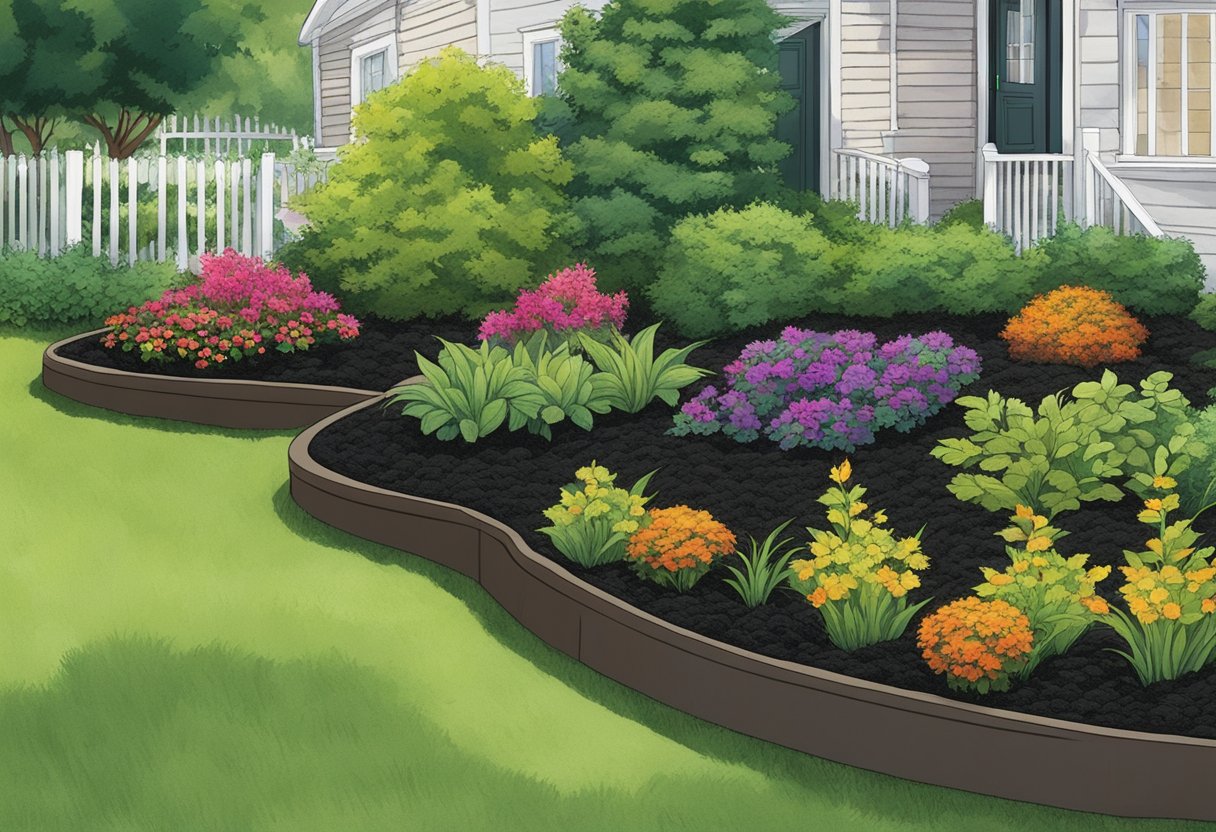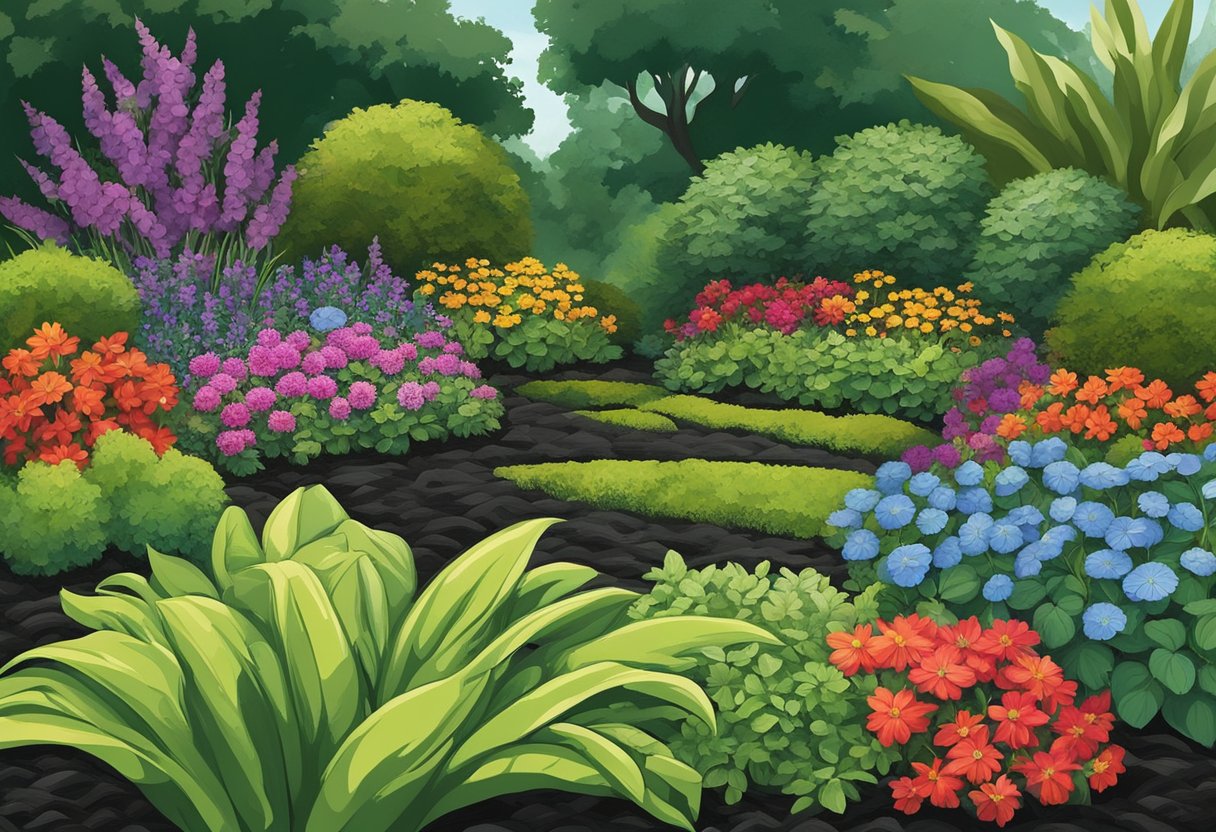Black mulch serves an important role in both aesthetic and functional aspects of gardening and landscaping. We choose black mulch for its ability to create a striking contrast that highlights the vibrant colors of flowers and foliage in our gardens. Not only does it offer a polished look to landscape designs, but it also has practical benefits. We apply it to suppress weeds, retain soil moisture, and help regulate soil temperature, which can be crucial during temperature fluctuations in different seasons.

As avid gardeners, we’ve learned that black mulch comes in a variety of materials including dyed wood chips, rubber, and even plastic sheeting in some cases. While the thought of adding mulch to a garden might seem straightforward, selecting the right type is key to ensuring the health of our plants and the environment. We look at factors such as the mulch’s longevity, its effects on soil health, and whether it aligns with our eco-friendly values. For instance, while rubber mulch might last longer, it doesn’t offer the same soil-enhancing benefits as organic wood chips.
In our landscaping endeavors, we favor black mulch for its sleek appearance and practicality. Ensuring the mulch is free from contaminants and is sourced responsibly are top priorities for us. By doing so, we not only give our gardens and landscape designs a professional touch but also contribute to a sustainable gardening practice that benefits the ecosystem as a whole.
Benefits of Black Mulch

Black mulch offers several advantages to enhance the health and appearance of your garden or landscape. We’ll explore its key benefits, discussing how it aids in moisture retention, suppresses weed growth, contributes to your garden’s aesthetic look, regulates soil temperature, and enriches the soil with nutrients.
Moisture Retention
Black mulch is effective in reducing water evaporation from soil. This is crucial for maintaining the moisture levels necessary for healthy plant growth. When we apply black mulch, it acts as a barrier that limits the amount of moisture lost to the air, leading to less frequent watering needs.
- Water Usage: Decreases the garden’s irrigation requirements.
- Consistency: Helps maintain uniform soil moisture.
Weed Suppression
Weeds are a persistent issue in gardens, competing with our plants for resources. Black mulch inhibits weed germination and growth by blocking sunlight.
- Light Blockage: Dense coverage that prevents weed seeds from sprouting.
- Maintenance: Diminishes the need for constant weeding in our landscapes.
Aesthetic Appeal
Black mulch adds visual interest and contrast. Its rich color provides a backdrop that makes the colors of our plants stand out. This can significantly enhance the overall look of our gardens and landscapes.
- Contrast: Offers a bold color that accentuates plant hues.
- Uniformity: Creates a clean, cohesive appearance in garden beds.
Temperature Regulation
The temperature of soil is key to plant health, and black mulch helps to moderate it. In cooler months, it retains warmth, and during hot weather, it can keep soil cooler by shading it from direct sunlight.
- Cooling Effect: Protects plants from extreme heat by providing shade.
- Warmth Preservation: Acts as an insulator to keep roots warm when it’s cooler.
Soil Nutrition
As black mulch breaks down over time, it contributes organic materials back into the soil. This process slowly releases nutrients that are beneficial for plant growth and improves soil structure.
- Nutrient Release: Adds vital minerals to the soil as it decomposes.
- Soil Structure: Improves soil aeration and texture, promoting root development.
Types and Usage of Black Mulch

When selecting black mulch for our landscaping projects, we consider both the functional benefits—such as weed suppression and moisture retention—and the aesthetic appeal it offers.
Organic Black Mulch
Organic black mulch typically includes wood chips that are dyed with a carbon-based colorant. The dye is used to provide a uniform, dark color that can enhance the visual appeal of garden beds. While wood chips contribute to soil health by decomposing over time, they require periodic replacement as they may fade or wash away.
- Products: Dyed black wood chips
- Usage: Ideal for garden beds, suppressing weeds, retaining moisture
Inorganic Black Mulch
Inorganic options, such as plastic mulch and rubber mulch, are also available in black. Plastic mulch often refers to landscape fabric or polypropylene sheets that block weed growth while allowing air and moisture to pass through. Rubber mulch is made from recycled tires and is long-lasting, though it does not enrich the soil as organic mulches do.
- Products: Landscape fabric, rubber mulch
- Usage: Suited for pathways, playgrounds, areas requiring durability
Application Techniques
For application, we measure the area in cubic feet to determine the quantity needed and use a rake to spread the mulch evenly. It’s vital to avoid piling mulch against plant stems or tree trunks to prevent moisture-related diseases.
- Tools: Rake, measuring tape
- Tips: Spread evenly, keep mulch away from plant bases
Safety and Environmental Considerations
We’re vigilant about potential issues related to toxic chemicals that might affect the environment or pets. With organic mulches, we check that the dye is non-toxic, while for inorganic options, we’re attentive to any chemicals that may leach into the soil.
- Considerations: Non-toxic dyes, checking for leachates
- Focus: Protection of local ecosystems, pet safety